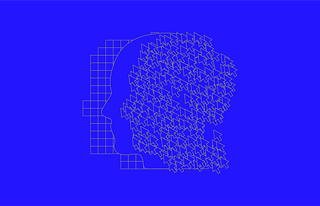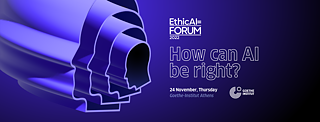24.11.2022
EthicAI=FORUM How Can AI Be Right?
Date: 24th November 2022
Venue: Goethe-Institut Athens
The EthicAI=FORUM 2022 will offer its contribution to this debate by presenting the results of the fellow teams' collaborations within the project.
Fifteen fellows from Southeast Europe took part in this regional project, forming four teams. Their creative ideas developed over the course of the project, with the support of three mentors from Greece, Romania, and Turkey. The 6-month collaboration will culminate on November 24th, when the teams will present the results of their work to the public.
The EthicAI=FORUM will take place at Goethe-Institut Athens on November 24th, giving the floor to the teams’ works ranging from art installations to a healthcare application and a research paper. The event programme includes a panel discussion with presentations by the four teams where they’ll share more about the project's concept, their motivation to pick this topic, the methodology they used, and their insights from the working process.
How can AI be right? is the core question of a cross-disciplinary panel discussion with project mentors Mihaela Constantinescu (RO), Marinos Koutsomichalis (GR), and Fatih Sinan Esen (TR) on the topics the teams have chosen in their projects.
EthicAI=FORUM will be a showcase for what young professionals in the SEE region find interesting and relevant in terms of the application of AI in people’s lives, and it will present the project fellows’ contributions to this debate.
PROGRAMME
5:00 pm – Doors open, project exhibition6:30 pm – Welcome words by the Goethe-Institut, Athens
EthicAI=2022 Projects presentations:
AImotion (Adin Alispahić, Cristina Bodnărescu, Davor Ljubenkov, and Tarik Spahić)
ALMA (Adna Šišić, Lidia Stanulova, and Matei Stanciugelu)
Glubot (Katerina Petelova, Livia Zaharia, and Tamara Vukičević)
Blackbox (Anastasia Nefeli Vidaki, Lida Zacharopoulou, Mihaela Dobreva, Tea Rukavina, and Vivian Stamou)
7:30 pm – How can AI be right?
Panel with Mihaela Constantinescu (RO), Marinos Koutsomichalis (GR), and Fatih Sinan Esen (TUR)
8:30 pm – Reception & networking / party with DJ set by Hypermedium label
Bios of Panelists
Mihaela Constantinescu is a lecturer in the Faculty of Philosophy, University of Bucharest, and Executive Director of the Research Center in Applied Ethics (CCEA). She has published on topics related to virtue ethics, business ethics, and AI ethics, focusing her research on the normative interplay between the concepts of moral responsibility and moral agency in relation to individuals, organizations, and AI.
Marinos Koutsomichalis is an artist, scholar, and creative technologist. He is broadly interested in the materiality of self-generative systems, (post-)digital objecthood, sound, image, data, electronic circuitry, perception, selfhood, landscapes/environments, and media/technologies. He is a Lecturer in Creative Multimedia at the Cyprus University of Technology (Limassol, CY), where he co-directs the Media Arts and Design Research Lab.
Fatih Sinan Esen is a computer engineer also with a background in Business Administration. He is a Scientific Programs Chief Expert at the Scientific and Technological Research Council of Turkey (TUBITAK). His current areas of interest are Artificial Intelligence (Machine Learning and Deep Learning), Data Analytics and Text Mining, Social Media and Social Network Analysis and Marketing, Management and Organizational Behavior.
Hypermedium is an Athens-based music label aiming to showcase contemporary directions in electronic music, from mutated club music and electronic de-composition to advanced computer music synthesis and research in rhythmic idiosyncrasies.
Glubot
(Katerina Petelova, Livia Zaharia, and Tamara Vukičević)
AI Made by You, for You.
The project aims to help diabetics around the world using the data generated by continuous glucose monitoring sensors. Users with CGMs will be able to interact with the AI, proving that fear of the unknown is unfounded, be it of technology or of your own data; having the situation explained is an advantage that can literally put you in control.
AIMotion
(Adin Alispahić, Cristina Bodnărescu, Davor Ljubenkov, and Tarik Spahić)
Smiling, frowning, or raising the eyebrows can show a lot about the way a person is feeling in the moment. But to what extent are these features enough for an AI to truly reveal and influence a person’s emotions?
Tackling the idea of an AI system being reductionist in reading human emotions, the project invites participants to an intimate non-verbal dialogue with a machine capable of creating colors and visualizations based on the confidence level of the participants’ basic emotions, such as fear, anger, happiness, and disgust.
ALMA
(Adna Šišić, Lidia Stanulova, and Matei Stanciugelu)
How would you feel if we told you that you were being observed? Everywhere. Every day. Every minute. Every second.
What if we told you that your privacy was being invaded? By everyone. Everywhere. Every day. Every minute. Every second.
Would you feel uncomfortable? Disturbed? Threatened?
How long did it take before a new dystopian scenario started playing in your head? What does the plot revolve around: the loss of privacy, constant surveillance, discrimination, or the instinctive fear of human redundancy? Choose wisely. The clock is ticking.
BLACKBOX
(Anastasia Nefeli Vidaki, Lida Zacharopoulou, Mihaela Dobreva, Tea Rukavina, and Vivian Stamou)
An interdisciplinary art installation exploring gender bias in Artificial Intelligence. Are AI algorithms biased? Why are many women (self-)excluded from the STEAM fields and the discussions around AI?
Inspired by our own shared experiences of discrimination in the workplace, this project is the outcome of the international collaboration of five young female professionals, researchers, and artists, united by a common passion for technology and AI.
Drawing from the definition of the black box as a complex system whose internal workings are hidden or not readily understood, the exhibition invites guests to enter a physical maze and walk through various aspects of gender bias, presented using storytelling and AI algorithms such as facial recognition and text-to-image generators.


